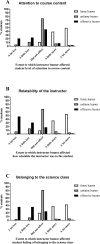To be funny or not to be funny: Gender differences in student perceptions of instructor humor in college science courses
- PMID: 30110389
- PMCID: PMC6093647
- DOI: 10.1371/journal.pone.0201258
To be funny or not to be funny: Gender differences in student perceptions of instructor humor in college science courses
Abstract
For over 50 years instructor humor has been recognized as a way to positively impact student cognitive and affective learning. However, no study has explored humor exclusively in the context of college science courses, which have the reputation of being difficult and boring. The majority of studies that explore humor have assumed that students perceive instructor humor to be funny, yet students likely perceive some instructor humor as unfunny or offensive. Further, evidence suggests that women perceive certain subjects to be more offensive than men, yet we do not know what impact this may have on the experience of women in the classroom. To address these gaps in the literature, we surveyed students across 25 different college science courses about their perceptions of instructor humor in college science classes, which yielded 1637 student responses. Open-coding methods were used to analyze student responses to a question about why students appreciate humor. Multinomial regression was used to identify whether there are gender differences in the extent to which funny, unfunny, and offensive humor influenced student attention to course content, instructor relatability, and student sense of belonging. Logistic regression was used to examine gender differences in what subjects students find funny and offensive when joked about by college science instructors. Nearly 99% of students reported that they appreciate instructor humor and reported that it positively changes the classroom atmosphere, improves student experiences during class, and enhances the student-instructor relationship. We found that funny humor tends to increase student attention to course content, instructor relatability, and student sense of belonging. Conversely, offensive humor tends to decrease instructor relatability and student sense of belonging. Lastly, we identified subjects that males were more likely to find funny and females were more likely to find offensive if a college science instructor were to joke about them.
Conflict of interest statement
The authors have declared that no competing interests exist.
Figures


References
-
- Seymour E, Hewitt NM. Talking about leaving: why undergraduates leave the sciences. Boulder (Colo.): Westview Press; 1997.
-
- Osborne J, Collins S. Pupils’ views of the role and value of the science curriculum: A focus-group study. Int J Sci Educ. 2001;23: 441–467. 10.1080/09500690010006518 - DOI
-
- Strenta AC, Elliott R, Adair R, Matier M, Scott J. Choosing and Leaving Science in Highly Selective Institutions. Res High Educ. 1994;35: 513–547.
-
- Ebenezer JV, Zoller U. Grade 10 Students’ perceptions of and attitudes toward science teaching and school science. J Res Sci Teach. 1993;30: 175–186. 10.1002/tea.3660300205 - DOI
Publication types
MeSH terms
LinkOut - more resources
Full Text Sources
Other Literature Sources

